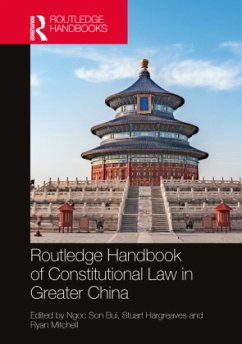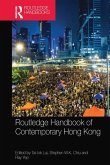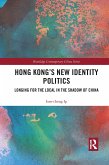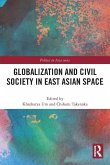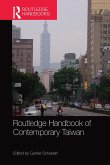The Handbook of Constitutional Law in Greater China surveys important issues of constitutional law in Mainland China, Hong Kong, Macau, and Taiwan. It synthesizes existing scholarship, debates, and views on important constitutional issues in the four jurisdictions. Written by a range of scholars, it contributes to both national and comparative scholarship on constitutional law in these jurisdictions. The book includes four parts:
Part I: History. This part explores the constitutional movement of the Qing dynasty; constitutional projects in modern China; and aspects of the drafting and implementation history of the Hong Kong and Macau Basic LawsPart II: Structure. This part discusses the relationship between the party-state and the Chinese constitutional order; Chinese constitutionalism; constitutional aspects of city development under the SAR concept; constitutional review in Mainland China; a history of Taiwan's 'Council of Grand Justices'; and judicial review in both Hong Kong and MacauPart III: Rights, Society, and Economy. This part deals with Hong Kong's National Security Law and its impact on the 'one country, two systems model'; social movements and constitutionalism; LGBT rights advocacy; the integration of capitalist regions within socialist China; the constitutional relevance of labour reforms in Mainland China; healthcare rights in both the Mainland and the SARS; and foreign investment under Art. 18 of the PRC ConstitutionPart IV: Transnational Engagement. This part surveys comparative writings on China's constitution; the influence of international human rights treaties on China's constitutional order; the international dimension of Hong Kong's constitutional order; and the changing role of the 'overseas judges' in Hong Kong
Exploring both historical and cutting-edge constitutional issues, this reference book is important reading for law researchers, lawyers, graduate students, undergraduates, and practitioners in the field of constitutional law and politics in Mainland China, Taiwan, Hong Kong, and Macau.
Part I: History. This part explores the constitutional movement of the Qing dynasty; constitutional projects in modern China; and aspects of the drafting and implementation history of the Hong Kong and Macau Basic LawsPart II: Structure. This part discusses the relationship between the party-state and the Chinese constitutional order; Chinese constitutionalism; constitutional aspects of city development under the SAR concept; constitutional review in Mainland China; a history of Taiwan's 'Council of Grand Justices'; and judicial review in both Hong Kong and MacauPart III: Rights, Society, and Economy. This part deals with Hong Kong's National Security Law and its impact on the 'one country, two systems model'; social movements and constitutionalism; LGBT rights advocacy; the integration of capitalist regions within socialist China; the constitutional relevance of labour reforms in Mainland China; healthcare rights in both the Mainland and the SARS; and foreign investment under Art. 18 of the PRC ConstitutionPart IV: Transnational Engagement. This part surveys comparative writings on China's constitution; the influence of international human rights treaties on China's constitutional order; the international dimension of Hong Kong's constitutional order; and the changing role of the 'overseas judges' in Hong Kong
Exploring both historical and cutting-edge constitutional issues, this reference book is important reading for law researchers, lawyers, graduate students, undergraduates, and practitioners in the field of constitutional law and politics in Mainland China, Taiwan, Hong Kong, and Macau.

